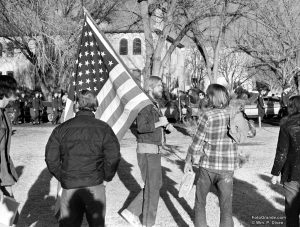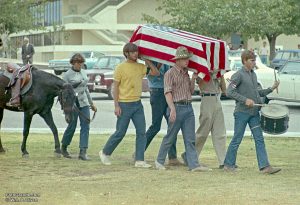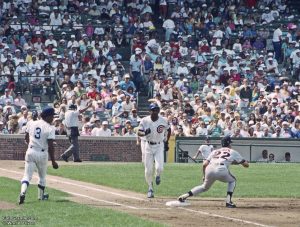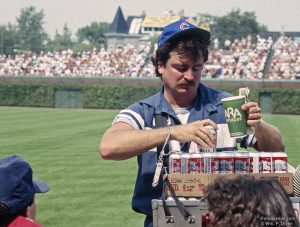I’ve reached the point of alternating between active partisan engagement and deep, dark depression. And that’s just with the Cubs.
Then along comes Washington Post columnist Dana Milbank, an articulate if misguided soul, who blames the rise of Donald Trump and the current sad state of the country’s politics and society on Baby Boomers. To invoke a term of my Boomer compatriots, that’s a mind-blowing claim while casually dismissing with a single passing reference the ill-conceived and fraudulently peddled war in Vietnam.

Veteran and war protester Gary Werner marches in parallel with ROTC cadets. New Mexico State University, early 1970. Photo © William P. Diven. (Click photo to enlarge)
Boomers, coddled in their youth, grew up selfish and unyielding. When they got power, they created polarization and gridlock from both sides. Though Vietnam War-protesting boomers got the attention, their peers on the right were just as ideological, creating the religious right.
— Dana Milbank in the Albuquerque Journal, Oct. 28, 2016
Milbank was born in 1968, a tumultuous but more violent baseline for judging current events. About the time we fled Saigon he would have been asking Santa for a Big Wheel tricycle. Yet those among his Gen-X colleagues who read a bit of history know that war so divided American youth the wound remains open and oozing as long as any two of us are alive to argue about the Domino Theory, Agent Orange, peace with honor, The Five O’clock Follies and the years we propped up French colonialism before doubling down on our own.
That those perpetrating this crime against our national ideals came from the Greatest Generation, which patented the military-industrial-political complex, is yet another piece of our history worthy of study and introspection. Since then we’ve seen the rise of political pandering on an industrial scale built on dividing rather than uniting people. You don’t hear much about Vietnam and communism anymore after our invading Iraq reset the clock on military folly.
Yeah, we Boomers made hash of the country, messed up, or, in Boomerspeak, fucked up, whether we inhaled or not. Happy I am to take my share of credit or blame. And so too should our elders and juniors be contemplating where they fit into what brought us here and how we regain traction to move forward. If we Boomers broke the country, what is Milbank’s generation doing to put it back together?

War protesters, one of them an Air Force ROTC cadet, mimic a funeral procession leading to a 1971 rally at New Mexico State University. Photo © William P. Diven. (Click photo to enlarge)
Many fewer U.S. troops died from all causes in Vietnam than in Civil War battles alone — 58,000 vs. 200,000 — yet by this time after Lee surrendered to Grant, Yankees and Rebels had held at least 10 joint reunions leading toward the big gatherings at Gettysburg in 1913 and 1938. The list of events at New Mexico State’s homecoming this year certainly didn’t include a meet-up of anti-war protestors and ROTC graduates from the ’60s and ’70s. Were one to be held, weapons should be checked at the door and a two-drink limit enforced.
About the best to be said today is some of us resist unfriending Facebook friends whom we believe to be politically insane.
Drama, danger and paranoid impulses course through the DNA of our political corpus dating to the times when hand-printed pamphlets and newspapers set off shouting matches if not fisticuffs and clubbings. All the Interweb and its social-media spawn have done is speed up delivery of self-serving messages with or without basis in fact. History is nothing without context, and our roots extend well beyond hippies and Nixonettes.
So, too, run deep the tethers binding loyal fans to the Chicago Cubs whose drama, danger and paranoid impulses date to at least the living memory of 1945 with no one still around from the club’s last World Series pennant in 1908. That’s the year Oklahoma became a state, and Mr. and Mrs. Jacob Murdock become the first to drive a car across the country wrestling their Packard from Los Angeles to New York in only 32 days. In my lifetime all I’ve heard from the north side of Chicago at the end of baseball season has been, “Next year.”
My own descent into baseball madness began when Ernie Banks still played shortstop and any kid worth his Baseball Digest could recite the starting lineups for all 16 teams (there are 30 today). The prospect of lights at Wrigley Field was unthinkably absurd despite such appliances sprouting everywhere after the first night game. “They didn’t think the lights would be good enough,” sportscaster Red Barber recalled for United Press International. “There were a lot of old liners who said baseball was meant to be played in the daytime. The moment the lights came on, everyone was convinced.”
Not so on Chicago’s north side. Barber called that first night game — Philadelphia at Cincinnati — in 1935. It would be 53 years before lights lit up Wrigley.

The Cubs Andre Dawson aka The Hawk is out at first base late in the 1991 season. The Cubs beat the Giants this day. No. 3 is first base coach José Martinez, and the first baseman is Will Clark. Photo © William P. Diven. (Click photo to enlarge)
Ernie moved from short to first the same year I did on a Little League field 100 miles to the west. I wore his No. 14 on my red team T-shirt touting our sponsor, Martin’s Drive-In. The team was good, we played hard and had fun, but always go for a sponsor who provides root beer regardless of the final score.
Losing is a right of passage for Cub fans, and “Take Me Out to the Ball Game” is not our song.
Do they still play the blues in Chicago
When baseball season rolls around?
When the snow melts away, do the Cubbies still play
In their ivy-covered burial ground?When I was a boy, they were my pride and joy
But now they only bring fatigue
To the home of the brave, the land of the free
And the doormat of the National League.
— A Dying Cub Fan’s Last Request, Steve Goodman, 1983. (Goodman, a north side Chicago native known for City of New Orleans, wrote three songs about the Cubs and died in 1984 at age 36.)
So it’s been a herky-jerky pony ride known more for getting bucked off than dismounting unscathed. Being in the World Series is no small accomplishment and certainly worthy of acclaim. Yet it is a dark time where hope struggles to resist crushing forces, where “there’s always next season” inspires ongoing dread. And that’s just the election.

Beer and baseball were meant for daytime consumption at Wrigley Field. Cubs vs. Giants, 1991. Photo © William P. Diven. (Click photo to enlarge)
Loosely relate links on FotoGrande.com
On 1968: Peace, Play and ‘Questionable Amusements’ on Phantom Lake
On the Cubs in the 1960s: Say It Ain’t So, Lou Brock!

